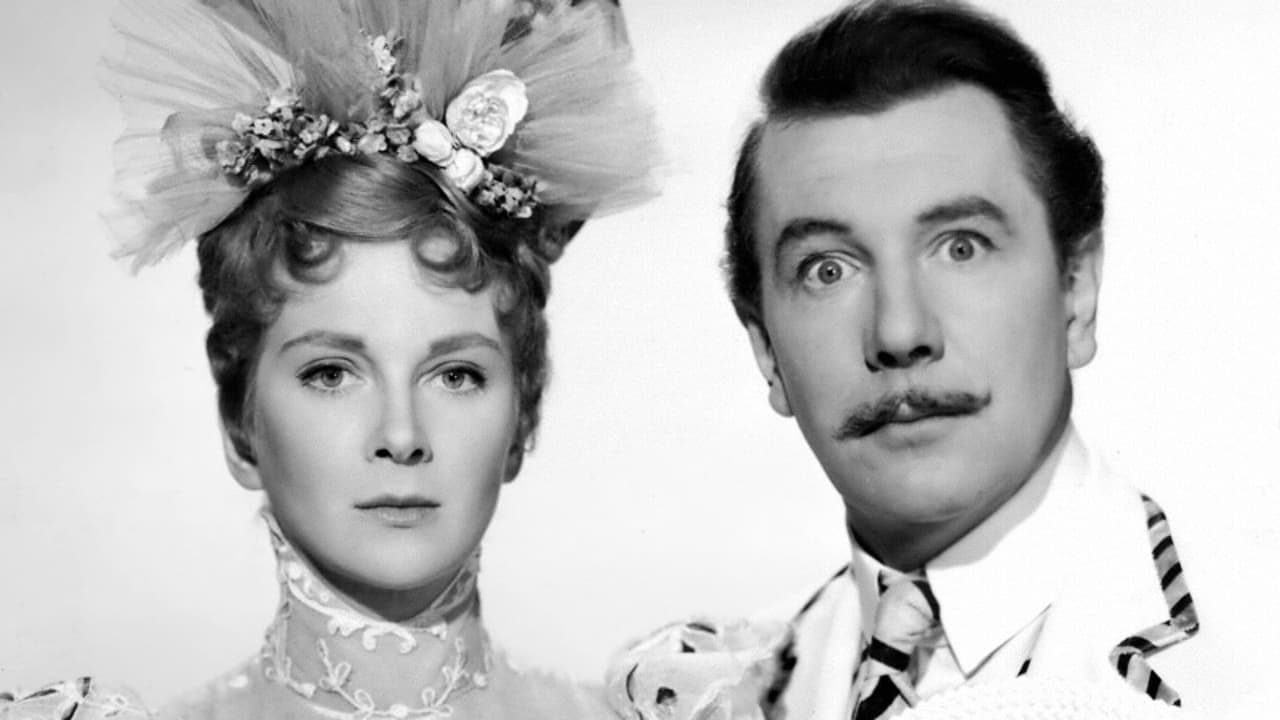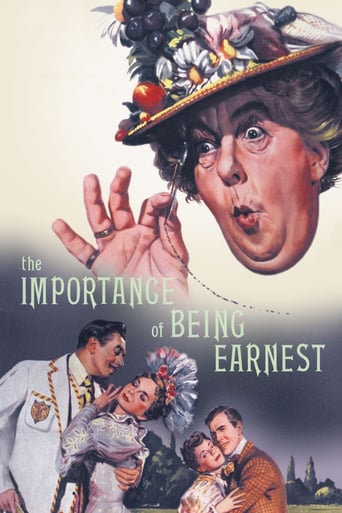

One of the most wickedly delightful plays ever written is brought to the big screen in this fine adaptation (1952).Two trained stage actors (Michaels Redgrave and Denison) give superb performances as John Worthing and Algernon Moncrieff, modulating their style for film (watch, for instance, the flicker Redgrave gives Worthing's mustache as Gwendolen hits around his guilty secret).The rest of the cast reads like a menu at a top restaurant. Joan Greenwood, who starred in several classic movies of the time ("Man in a White Suit"; "Kind Hearts and Coronets") lends her smokey voice to Gwendolyn. Dorothy Tutin, here in her first movie role as Cicely, would go on to great success on stage and screen. And the wonderfully dotty Margaret Rutherford and Miles Malleson set the bar high for anyone who later approaches the roles of Miss Prism and Canon Chasuble. The perfect cast reaches right down to Richard Wattis, appearing for a matter of seconds and with no lines, providing eyebrow-raising hilarity as "Seton."The pride of place, however, belongs to Edith Evans. Lady Bracknell was one of her signature roles on stage. Here, in a performance both perfectly suited for the big screen yet dominating it as well, she is somehow able to hit every note of the human voice in words like "handbag" and, perhaps even more brilliantly, "found?" (In a much later radio version, Dame Judi Dench proved a letdown as Lady Bracknell, after too much familiarity with Evans' extraordinary voice modulations).The script is a bit disappointing. While I found it perfectly sparkling on my first viewing (and my tenth), later reading and watching other versions of the play on the stage and on tv, I found this version cuts whole swathes of Wilde's dialogue. To be fair, the play exists in more than one version. And a full movie version of nothing but talk would spill over two hours, while this version runs slightly over an hour and a half. And, to be honest, Wilde's paradoxes are occasionally overwhelming (and even tiresome when they're all strung together). But many great lines are cut and at least one unfortunately truncated (Gwendolen saying, "The suspense it terrible!" In the play, it continues, "I do hope it will last!")Perhaps due to the play's preternatural artificiality (especially the crassness and lack of feeling Wilde puts in the mouths of his characters) the movie has a curtain-raising and -lowering framing device. If nothing else, it helps those unfamiliar with Wilde or the play know it originated on the stage. The sets are obviously artificial, but Wilde's lines belong in an artificial world. Some have criticized this movie as "static" (not opening out the play as Branagh did for Shakespeare forty years later). But this play is nothing but talking heads in their own universe; the movie serves as an invaluable introduction to Wilde (it was for me), performed by some of the finest British actors of the time. No villains appear in the piece (unless the proto-Wodehousean aunt Lady Bracknell is one). No one is going to blow up the world. No one has a gun. The characters lead complex lives that need untangling in a comic way. That is all. If you can't sit through ninety minutes of truly wonderful actors mouthing some of the cleverest lines ever written for the stage, this movie's not for you.Perhaps not one of the great movies, but a finely-cast filmed version of a great play. After pointing out the many cuts made to the play, the one sour note in the thing is the introduction of a distant cuckoo in the catty tea scene between Gwendolen and Cicely. It's a bit too much. Otherwise, as Wilde's contemporaries Gilbert and Sullivan might say, it's rapture.
... View MoreGreat comical overtones are depicted in this 1952 film which is also a test of morality, decency, and being most ethical.The film showcases the great performance of Dame Edith Evans as the mother of Gwendolyn. Her examination of the quality of the suitor for her daughter is hilarious at best since Evans exemplifies the true usual connotation that a future mother-in-law might possess.The discovery at the end of the film relating to the relationship of the two guys is a very convenient but apt way of swaying Evans as well as her change in attitude when she discovers that her future daughter-in-law is quite an heiress.A virtuous film, well acted by all. Michael Redgrave certainly is not subtle here and Margaret Rutherford, as the attendant, who lost a child in her care years before, is a joy to watch.
... View MoreThis is a comedy (play) by Oscar Wilde. Two Victorian bachelors have to reveal some of their secrets as they arrange to tie the knot. This film (play) is too urbanely clever and witty by half (unfortunately not a compliment).I am an average viewer who had never heard of this play until I started watching it. I had of course heard of Oscar Wilde and that kept me watching this period piece that is a trial to get through. If you are one of those who find Punch magazine riotously funny and long for the Harvard Yale game you might like it. No modern normal person will.Other reviews suggest Wilde loathed the type characters portrayed in the play. I hope so and maybe I should re-watch it as a parody of sorts but I don't have the energy to digest the tons of dialogue. I read Dorian Gray years ago and found it also stilted a tiresome read. The descriptions of London's upper class society were boring and forced some of that same feeling comes across in this play.One reviewer stated that Earnest was a code word for homosexual if so that is amusing. (I am gay). The Netflix streaming version was colorized so heavily it distracted watch it in black and white if you can.DO NOT RECOMMEND. Gets 2 extra stars as the Earnest hidden joke thing may be true.
... View MoreJack is in love with Gwendolen. His friend Algy is in love with Cecily. Both women want to marry a man named Ernest, so the men have both pretended to their fiancées that they are called Ernest. Such deception in matters of the heart is surely ill-advised There have been many adaptations of Oscar Wilde's classic comic play of high society manners, but this is the timeless definitive one. It probably works best because it doesn't really try to be a movie, it's just a staging of the play with crisp early colour photography and very little fuss. All of the principal cast are pretty much perfect in these roles; Redgrave's mannered, elegant, raised-eyebrow pomposity is irresistible. Dennison has a whale of a time as the caddish Algy. Tutin and Greenwood are as fine a pair of English stuffed prunes as ever took high tea, and the always reliable Rutherford is a scream as the guilt-strewn Miss Prism. Undoubtedly top of the heap though is Evans as the formidable Lady Augusta Bracknell. Evans had a whole career worth of stage experience behind her, and makes Wilde's much-celebrated battleaxe hilarious, terrifying, slightly sozzled and unforgettable. She has so many great lines it's folly to pick one, but I think my favourite is, "Ignorance is like a delicate exotic fruit; touch it, and the bloom is gone. The whole theory of modern education is radically unsound. Fortunately in England, at any rate, education produces no effect whatsoever.". The terrific cast and simple approach combine to deliver Wilde's sublime writing to the hilt. What I love so much about this play is that not a line or word is wasted; everything is funny, nuanced, part of the story, part of the comic absurdity. I generally enjoy plays, but many could do with a lot of pruning (try getting through Act IV of King Lear if you don't believe me). This on the other hand is as close to perfection as comic writing gets, as if Wilde had somehow worked out mathematically what constituted the most perfectly-formed funny stageplay. Okay it's maybe not for all tastes, but as a brilliantly observed little dig at love and aristocratic foibles it's an absolute gem. My favourite observation on Wilde is by Dorothy Parker, who said, "If with the literate I am / Impelled to try an epigram / I never seek to take the credit / We all assume that Oscar said it.". Draw the shades, make yourself a nice cuppa, and enjoy this comic delight.
... View More